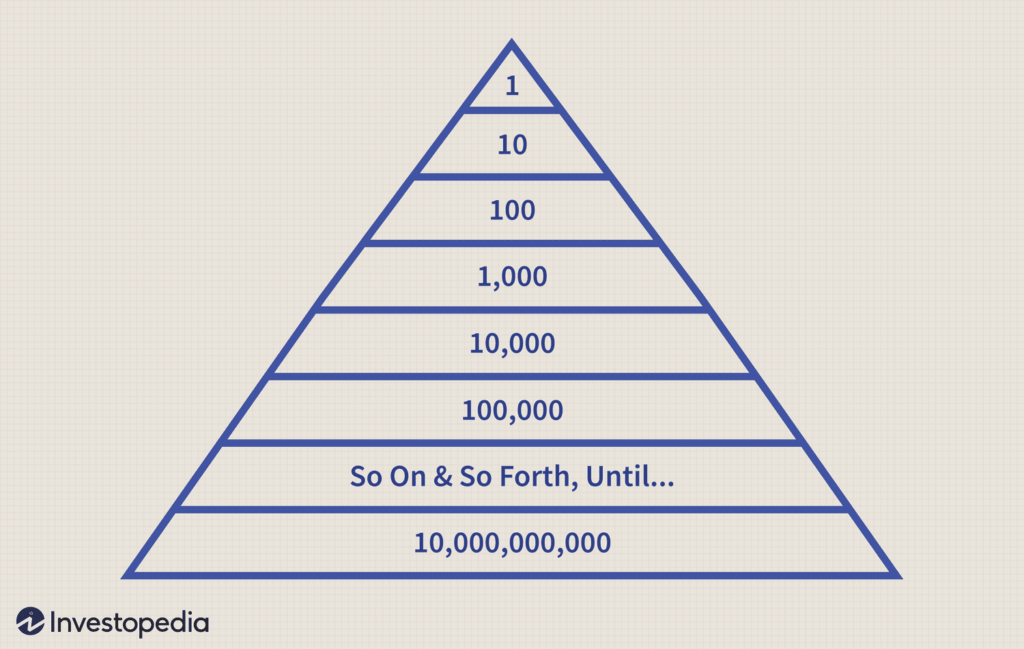MLM Scam: Multi-Level Marketing (MLM) companies, often at the center of discussions regarding their sales approach, which involves person-to-person transactions, have garnered attention for their unique business models. In this detailed look at MLMs, we uncover how these companies operate, explain their structure, discuss how much money you might make, and point out the problems that come with them.
If you are considering joining an MLM or are intrigued by the MLM scam phenomenon, this examination will provide valuable insights into the intricacies of this industry. In this comprehensive exploration, we delve into the workings of MLMs, shedding light on their structure, potential earnings, and the pitfalls associated with them.
Table of Contents

How MLMs Operate
MLM companies operate on the principle of direct selling, where individuals, termed “distributors” or “participants,” engage in selling products or services. This can happen in various settings, from the comfort of one’s home to online platforms. The revenue generation in MLMs typically occurs through two primary avenues:
- Selling to Retail Customers: Distributors have the opportunity to sell the MLM’s products directly to retail customers who are not involved in the MLM structure. This traditional sales approach forms a fundamental aspect of MLM business models.
- Recruiting and Commissions: Earnings are not limited to product sales; distributors can recruit new members and earn commissions based on both their recruits’ purchases and their recruits’ sales to retail customers. This forms a hierarchical structure known as the “downline.”

Pyramid Schemes: Unveiling the MLM Scam
Pyramid schemes, often disguised as legitimate MLM opportunities, pose a significant threat to unsuspecting individuals. Distinguishing between a genuine MLM and a pyramid scheme is crucial for safeguarding financial interests. Key indicators of a pyramid scheme include:

- Extravagant Earning Promises: Promoters making unrealistic promises about potential earnings should raise immediate concerns. Legitimate MLMs focus on realistic income expectations.
- Emphasis on Recruitment: Pyramid schemes prioritize recruitment over product sales, relying on a constant influx of new distributors to sustain the business. In contrast, a genuine MLM emphasizes product sales as a viable source of income.
- High-Pressure Sales Tactics: Tactics pressuring individuals to make quick decisions without adequate consideration are warning signs. Reputable MLMs allow individuals time to study the company and make informed choices.
- Forced Product Purchases: In pyramid schemes, participants may be compelled to buy excessive amounts of products regularly, even when existing inventory remains unsold. This can lead to financial strain.

Considering an MLM: A Personal Reflection
Before delving into the world of MLMs, individuals must introspect and consider several factors:
- Comfort with Sales Role: Joining an MLM entails taking on the role of a salesperson. Individuals uncomfortable with selling or convincing others to invest may find MLMs challenging.
- Solid Sales Plan: Consider whether a reliable sales plan exists. Are there friends and family willing to consistently purchase the products? Is there a sustainable customer base?
- Realistic Income Goals: Despite dedication and hard work, the majority of MLM participants make minimal or no income. Understanding realistic income expectations is vital.
- Financial and Time Commitment: Assess the financial and time commitments associated with the venture. MLMs, like any business, involve risks and expenses. Borrowing money without a clear strategy can lead to financial strain.

Due Diligence: Navigating the MLM Landscape Wisely
- Research the Company: Extensive online research, including reviews, complaints, and news articles, provides insights into the company’s reputation. State attorney general offices can be consulted for complaints.
- Distributor Testimonials: Genuine MLM distributors often share their experiences online. Beware of overly positive claims, and be skeptical if earnings appear to rely solely on recruitment.
- Product Quality Assessment: Legitimate MLMs prioritize product sales. Assess the quality, uniqueness, and market demand for the products. Beware of exaggerated health claims or guaranteed results.
- Understanding Costs: MLMs may require purchases of training materials or attendance at seminars. Clarify which expenses are mandatory, as opting out could impact eligibility for bonuses or rewards.
- Refund Policies: Obtain the company’s refund policy in writing. Understand the conditions, restrictions, and timeline for returning unused products. Clarify whether full or partial refunds are offered.
- Professional Review: Seek input from trusted individuals not affiliated with the MLM. Accountants, lawyers, or advisors can provide valuable insights into the legitimacy of the MLM and its alignment with personal goals.

Unveiling Banned MLM Companies in India: A Cautionary Tale
The MLM landscape in India has witnessed both positive and negative developments. To protect consumer interests and maintain industry integrity, the Indian government has taken decisive actions against MLM companies engaging in unfair practices. Let’s uncover the stories behind these banned MLM Companies in India.
The Dark Side of Banned MLM Companies Revealed:
- QNet: Originating from Hong Kong, QNet entered the Indian market in 2001, initially marketing gold commemorative coins. However, in 2003, India declared QNet a Ponzi scheme, leading to its ban. The company started selling more things like products for the home, beauty items, travel services, educational stuff, and other stuff too.
- Saradha Group: An Indian conglomerate with diverse business operations, including network marketing, the Saradha Group targeted individuals in West Bengal, Assam, and Odisha. Offering investment opportunities, the group faced a ban due to fraudulent activities.
- SpeakAsia Online: Operating as a Singapore-based MLM company in India from 2010 to 2011, SpeakAsia Online claimed to be a market research company offering online surveys. Promising substantial earnings, the company faced a ban for its deceptive practices.
- PACL Ltd.: Although not strictly an MLM company, PACL Ltd. operated a massive investment MLM scam in India. Claiming involvement in real estate, the company relied on collecting investments. In 2016, the Securities and Exchange Board of India (SEBI) banned PACL, ordering significant refunds to investors.
- Mission Green India: Included in the MLM scam alert list compiled by Strategy India, Mission Green India faced scrutiny for its unethical business practices. The ban reflects concerns related to pyramid schemes or deceptive strategies.
- Jivan Daan: Strategy India’s MLM scam alert list also features Jivan Daan. This MLM company likely engaged in activities that violated regulatory guidelines, resulting in its ban to protect individuals from potential financial harm.
- Dhan Vriddhi: The inclusion of Dhan Vriddhi in the MLM scam alert list highlights concerns about its business methods. Violations of regulatory guidelines, such as a focus on recruitment over product sales, may have led to the ban.
- Capcha Pay: Capcha Pay, found on the MLM scam alert list, is another banned MLM companies in India. The ban suggests that the company may have employed deceptive tactics or operated as a pyramid scheme, posing risks to participants.
- Amway India: While Amway is a well-known MLM giant globally, its operations in India have faced scrutiny. Amway India has been involved in legal battles and controversies related to its business model. Despite not being outright banned, the company’s practices have sparked debates on the sustainability and ethics of MLM structures.
| Sr. No | List of Banned MLM Companies |
| 1 | QNet |
| 2 | Saradha Group |
| 3 | SpeakAsia Online |
| 4 | PACL Ltd. |
| 5 | Mission Green India |
| 6 | Jivan Daan |
| 7 | Dhan Vriddhi |
| 8 | Capcha Pay: |
| 9 | Amway India |
| 10 | Forsage |
| 11 | OneCoin |
| 12 | Crowd1 |
| 13 | Royal Q |
| 14 | Meta Force |
| 15 | Younique |
| 16 | Primerica |
| 17 | Aaj Ka Bazaar |
| 18 | Aaj Kal Marketing |
| 19 | Aalam Traders |
| 20 | ABCD Funds |
| 21 | Add Guru |
| 22 | B2B Coins |
| 23 | Balaji Krupa Pariwar |
| 24 | BBOM India |
| 25 | BD Forex Limited |
| 26 | Be Rich Rich |
| 27 | Beacon Valley India |
| 28 | Best 4 Youth |
| 29 | Betting Seven x |
| 30 | Bindas Loot |
| 31 | Bizzbull |
| 32 | Block Matic |
| 33 | Capital Growup |
| 34 | Carspluscash.com |
| 35 | Cash 2All Wallet |
| 36 | Cash King |
| 37 | Catterpiller |
| 38 | Champ Cash |
| 39 | Club 1K |
| 40 | Colon Trade |
| 41 | D24H |
| 42 | Daily Add World |
| 43 | Darwin Platform group of companies |
| 44 | Dash Me |
| 45 | Delta Vine World |
| 46 | Devine Stock Group |
| 47 | Diamond Play Lottery |
| 48 | Discover Money |
| 49 | Donate Malaysia |
| 50 | Drona Enterprises India |
Identifying and Avoiding Banned MLM Companies: Tips for Vigilance:
As the MLM industry expands, the risk of encountering banned MLM companies engaging in unethical practices grows. Stay vigilant by recognizing red flags and following these tips:
- High Initial Investment: Exercise caution if an MLM demands exorbitant upfront fees or costly starter kits. Legitimate MLM opportunities generally have low entry costs. High initial investments can be a red flag, indicating a potential focus on extracting money from recruits rather than generating revenue through product sales. It’s advisable to critically assess whether the investment aligns with the value offered by the MLM and if the emphasis is on sustainable business practices.
- Pyramid Structure Warning: Avoid MLMs promoting a pyramid-like structure that primarily focuses on recruitment. Such structures often indicate illegal pyramid schemes. In a legitimate MLM, the emphasis should be on product sales, not solely on expanding the network. If recruitment becomes the primary driver of income, it may suggest an unsustainable model where only those at the top benefit, leaving those lower down in financial jeopardy. Understanding the company’s structure is crucial to avoid falling into a deceptive scheme.
- Lack of Retail Customers: Legitimate MLMs should boast a substantial base of retail customers. If sales primarily come from distributors within the network, it may signal an unsustainable MLM model. A healthy MLM business relies on genuine product sales to end consumers. If the majority of revenue is generated internally, through distributors purchasing products for personal use or qualification, it could indicate a lack of market demand for the products. This lack of focus on external sales is a warning sign of a potentially problematic MLM.
- Misleading Income Promises: Be wary of MLM companies that make extravagant promises about your earning potential. Unrealistic income expectations are a hallmark of deceptive schemes. If a company assures quick and substantial income without clear explanations of how it will be achieved, it’s a cause for concern. Legitimate MLMs emphasize realistic earnings through product sales and may caution against relying solely on recruitment for financial success. Examine statements about earnings, and if they sound too amazing to be real, they probably aren’t.
- Pyramid Scheme Structure: Understand the structure of the MLM to discern if it operates like a pyramid scheme. In pyramid schemes, recruitment takes precedence over actual product sales, leading to financial losses for participants. Legitimate MLMs derive income from genuine product sales, with commissions based on retail transactions. If the focus is overwhelmingly on building a network without a corresponding emphasis on product value, it raises suspicions about the sustainability and legality of the MLM model.

By paying attention to these nuances and red flags, individuals can safeguard themselves from MLM scams and make informed decisions when considering involvement with MLM opportunities.
Before Joining an MLM: A Precautionary Checklist
- Company Reputation: Extensive research into the MLM company’s history, track record, and legal compliance is essential. Positive reputation over time is a good indicator.
- Legal Compliance: Ensure the MLM company adheres to Indian government regulations. Verify its registration and licenses.
- Examine Compensation Plan: Thoroughly study the compensation plan to understand how earnings are generated. Transparent and fair compensation practices are crucial.
- Product Quality and Demand: Evaluate the quality, uniqueness, and market demand for the MLM’s products. Genuine MLM opportunities offer high-quality products with broad consumer appeal.
- MLM Software: Verify that the MLM company employs reliable MLM software with advanced features. This ensures an efficient and seamless experience for distributors, contributing to optimal business growth.

Conclusion
Navigating the MLM industry requires informed decision-making. Awareness of banned MLM companies, coupled with due diligence and vigilance, empowers individuals to make wise choices. Educate yourself, stay updated on MLM Scams and other industry practices, and seek professional advice to safeguard your success and financial well-being.
Is MLM scam legal in India?
No, MLM scams are not legal in India. The law prohibits any scheme that promises returns solely from enrolling new members rather than from selling products or services. Nevertheless, illegal pyramid schemes have been observed in India, disguising themselves as MLMs, despite the existing regulations.
What is the reason for banned MLM companies in India?
MLM companies are banned in India mainly because of their pyramid scheme structure. In a pyramid scheme, it’s all about getting more people to join, not really about selling actual products or services.
Why is MLM (Multi-Level Marketing) Illegal?
MLMs are deemed illegal if they primarily focus on recruitment without genuine product sales, mislead participants with false income claims, or operate as pyramid schemes. Illegal MLMs often lack transparency and violate consumer protection laws, posing risks to investors. It’s crucial to distinguish legitimate MLMs from those engaging in deceptive practices.









1 Comment
This comprehensive exploration of MLMs and the potential scams associated with them is eye-opening. 😮 It’s crucial for people to be aware of the red flags and pitfalls related to MLMs to protect their financial interests. 💰🚫 The cautionary tales of banned MLM companies in India serve as a stark reminder of the risks involved. 🇮🇳🚷 Thank you for shedding light on this important topic and providing valuable tips for vigilance. 🙏✅ #MLMScam #StayInformed 💡🔍